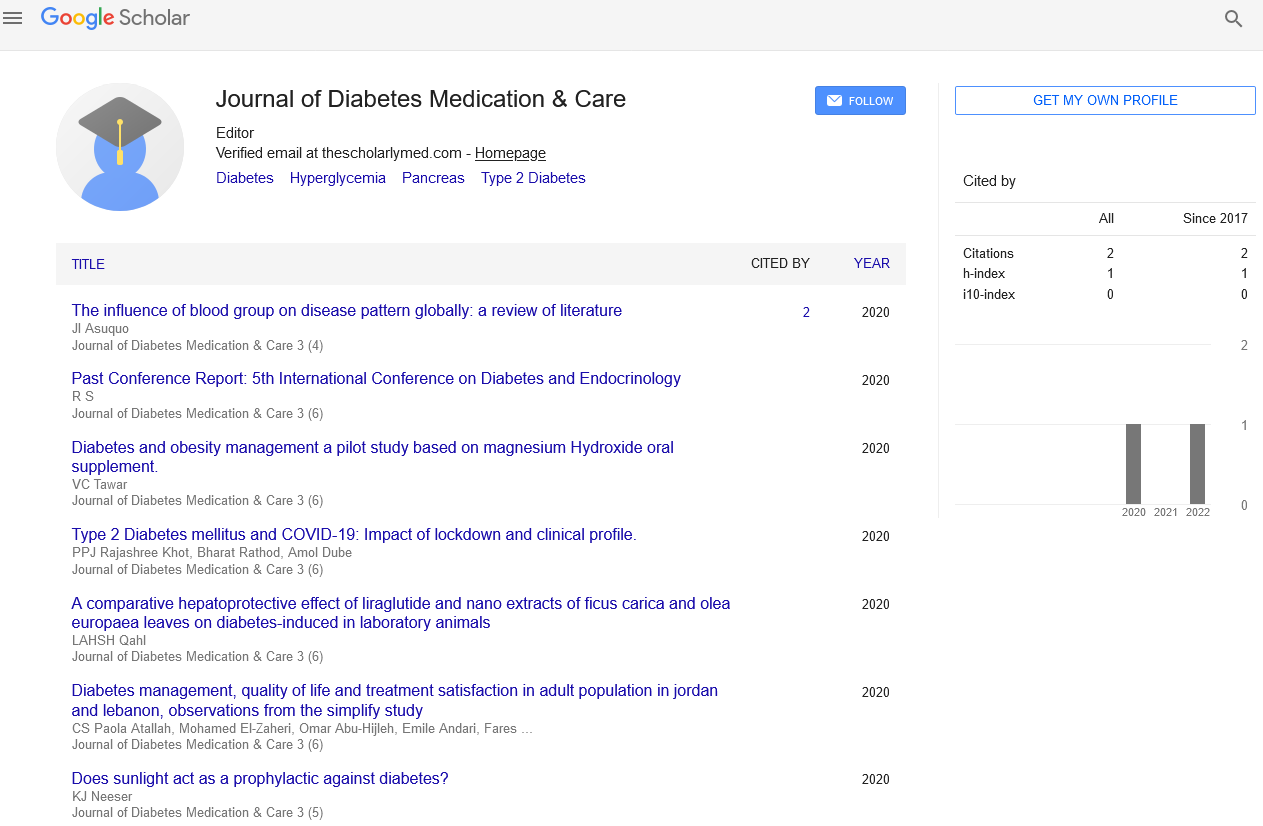Perspective - Journal of Diabetes Medication & Care (2024) Volume 7, Issue 1
Exploring the Intricate Link Between Cognitive Function and Diabetes: Unraveling the Mind-Body Connection
- Corresponding Author:
- Tiegas Yi
Department of Pharmacy Practice, Kalay University, Kalay, Myanmar
E-mail: szyitasdcasdv@126.com
Received: 03-Jan-2024, Manuscript No. JDMC-24-124929; Editor assigned: 05-Jan-2024, PreQC No. JDMC-24-124929 (PQ); Reviewed: 19-Jan-2024, QC No. JDMC-24-124929; Revised: 29-Jan-2024, Manuscript No. JDMC-24-124929 (R); Published: 07-Feb-2024, DOI: 10.37532/JDMC.2024.7(1).166-168
Introduction
Diabetes, a chronic metabolic disorder characterized by elevated blood glucose levels, has long been associated with a myriad of complications affecting various organs in the body. While much attention has been given to the cardiovascular, renal, and ocular implications of diabetes, recent research has shed light on the intricate link between diabetes and cognitive function. The interplay between these two seemingly distinct realms-the metabolic and the cognitive-has become a subject of increasing interest among researchers and healthcare professionals.
Description
Understanding diabetes and its impact on the brain
Diabetes, particularly type 2 diabetes, is known for its insidious onset and systemic effects. It arises when the body either doesn’t produce enough insulin or becomes resistant to its effects, leading to an accumulation of glucose in the bloodstream. This persistent hyperglycemia can wreak havoc on blood vessels and nerves throughout the body, including the brain.
Vascular complications and cognitive impairment
One of the primary mechanisms linking diabetes to cognitive decline is the impact on the vascular system. Chronic hyperglycemia contributes to the development of atherosclerosis-the hardening and narrowing of arteries-which can impede blood flow to the brain. As a result, individuals with diabetes are more prone to small vessel disease and microvascular damage, both of which are associated with cognitive impairment and an increased risk of dementia.
Neuroinflammation and oxidative stress
Diabetes is not solely a vascular disorder; it also triggers inflammatory and oxidative processes that can adversely affect brain function. Elevated levels of glucose in the blood lead to the production of Advanced Glycation End-products (AGEs), which can induce inflammation and oxidative stress in the brain.
Neuroinflammation has been implicated in various neurodegenerative disorders, including Alzheimer’s disease. Diabetes-induced inflammation may exacerbate the progression of cognitive decline by promoting the accumulation of beta-amyloid plaques, a hallmark of Alzheimer’s pathology. Moreover, oxidative stress can damage neurons and disrupt synaptic function, contributing to cognitive impairment.
Insulin resistance in the brain
Beyond its role in glucose regulation, insulin plays a crucial role in maintaining cognitive function. The brain is insulin-sensitive, and insulin receptors are abundant in regions responsible for learning and memory, such as the hippocampus. In individuals with type 2 diabetes, insulin resistance extends beyond peripheral tissues to the brain, impairing insulin signalling and disrupting normal brain function.
Research suggests that insulin resistance in the brain is a key player in the development of cognitive deficits associated with diabetes. It hampers the brain’s ability to utilize glucose efficiently, leading to energy deficits in neurons and contributing to synaptic dysfunction. Additionally, impaired insulin signalling may interfere with the clearance of beta-amyloid, further promoting cognitive decline.
The bidirectional nature of the diabetescognition relationship
While diabetes is recognized as a risk factor for cognitive decline and dementia, emerging evidence suggests that the relationship is bidirectional. Cognitive impairment, particularly in the domain of executive function, may contribute to poor diabetes management and exacerbate the metabolic consequences of the disease.
Impact of cognitive impairment on diabetes management
Cognitive impairment can pose significant challenges to individuals with diabetes in managing their condition effectively. Tasks such as medication adherence, blood glucose monitoring, and dietary modifications require cognitive abilities such as memory, attention, and executive function. Impairments in these cognitive domains can lead to suboptimal self-care practices, resulting in poor glycemic control and an increased risk of diabetes-related complications.
Cognitive implications of hypoglycemia
On the flip side, the pharmacological management of diabetes, particularly with insulin and certain oral hypoglycemic agents, carries the risk of hypoglycaemia-low blood glucose levels. Severe hypoglycemia can lead to cognitive dysfunction, ranging from confusion to loss of consciousness. Recurrent episodes of hypoglycemia may contribute to long-term cognitive decline, emphasizing the delicate balance required in diabetes treatment to avoid both hyperglycemia and hypoglycemia.
Promising interventions and strategies
Recognizing the intricate interplay between diabetes and cognitive function opens avenues for preventive and therapeutic interventions. Lifestyle modifications, pharmacological approaches, and cognitive interventions are being explored to mitigate the impact of diabetes on the brain.
Optimal diabetes management
Achieving and maintaining optimal glycemic control is paramount in preventing or slowing the progression of cognitive decline in individuals with diabetes. Regular monitoring of blood glucose levels, adherence to medication regimens, and lifestyle modifications, including a healthy diet and regular physical activity, play crucial roles in diabetes management.
The Diabetes Control and Complications Trial (DCCT) and its follow-up study, the Epidemiology of Diabetes Interventions and Complications (EDIC), demonstrated the long term benefits of intensive glucose control in reducing the risk of complications, including cognitive impairment. These findings underscore the importance of early and sustained glycemic control in preserving cognitive function.
Lifestyle interventions
Adopting a healthy lifestyle can have profound effects on both diabetes management and cognitive health. Regular physical activity has been shown to improve insulin sensitivity, reduce inflammation, and enhance cognitive function. Moreover, a Mediterranean-style diet rich in antioxidants, omega-3 fatty acids, and other neuroprotective nutrients has been associated with a lower risk of cognitive decline in individuals with diabetes.
Cognitive training programs, focusing on memory enhancement, attention improvement, and problem-solving skills, may also be beneficial. These interventions aim to capitalize on neuroplasticity the brain’s ability to reorganize itself to strengthen cognitive reserves and mitigate the impact of diabetes on the brain.
Pharmacological approaches
Several medications used in the management of diabetes have shown potential neuroprotective effects. Metformin, a commonly prescribed oral antidiabetic agent, has demonstrated anti-inflammatory and antioxidant properties that may benefit cognitive function. Additionally, incretin-based therapies, such as Glucagon-Like Peptide-1 (GLP-1) receptor agonists, have shown neurotrophic effects and may have protective effects on the brain.
Conclusion
The intricate relationship between diabetes and cognitive function highlights the need for a comprehensive approach to the management of this prevalent metabolic disorder. As the global burden of diabetes continues to rise, understanding and addressing the cognitive implications of the disease are becoming increasingly crucial.
Ultimately, the mind-body connection exemplified by the diabetes-cognition relationship underscores the holistic nature of healthcare. By embracing a multidimensional approach that considers both metabolic and cognitive aspects, we can strive towards a future where individuals with diabetes not only manage their condition effectively but also preserve and protect their cognitive well-being.

